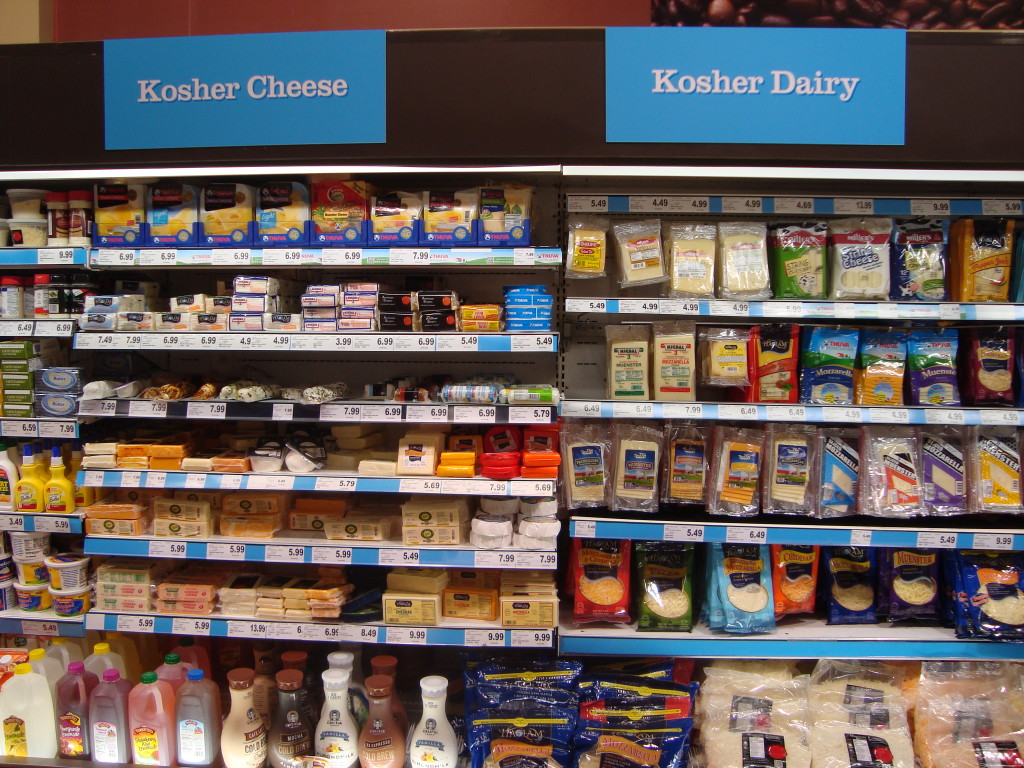Economic data can sometimes be impenetrable to the average person, especially when it refers to items like consumer surplus or foreign exchange rates. But consumer surplus and the value of the Canadian dollar can have a real-world impact on the daily lives of people when they roll their shopping carts down the kosher aisle and are confronted with prices that never seem to go down.
If you do any shopping, you’ll notice that food prices have taken a jump in recent months, beyond what veteran shoppers might have noticed in the last five years.
It’s not just kosher consumers who are affected. Everyone is paying more, as recent data compiled by Statistics Canada reveal.
READ: CONSUMERS STILL WAITING FOR ONTARIO KOSHER CHICKENS
Looking at the year that ended in January, the federal agency reported that food prices were up by four per cent, but that certain items, such as fresh vegetables, jumped by 18.2 per cent.
In a more detailed report that looked at average retail prices for a variety of consumer products, including meat, vegetables, fruit and household items, Statistics Canada reported that from December 2014 to December 2015, the cost of a kilogram of sirloin steak, not a kosher cut, rose by 14.3 per cent. Prime rib, which can be a kosher cut, rose by 12 per cent. Ground beef went up by six per cent and stewing beef by 6.8 per cent.
Even lowly macaroni, a staple for families, rose by 12.5 per cent in the year.

Vegans and vegetarians are feeling the pinch even more. The price of carrots rose by 13.8 per cent in the last year. Onions were up by 16.6 per cent; potatoes by 13.7 per cent; mushrooms by 7.2 per cent; and celery rose in price by a whopping 46.3 per cent in just one year.
So what can kosher consumers do?
Avi Moyal is a price-conscious shopper who picks up the groceries for his family of six every week or so. He makes a point of shopping at stores that price-match the competition and he uses a handy smartphone app, called Flipp, to get the best prices.
With Flipp, he said, you can download grocers’ weekly flyers and present the best price to supermarkets such as Walmart, No Frills and Superstore, which match prices. He figures he saves about $30 on a weekly grocery bill of $250, and it helps avoid the need to drive from store to store to get the best price.
Moyal, a Toronto real estate agent, enjoys purchasing groceries and has been doing it ever since he was a kid accompanying his mom on shopping expeditions. He’s noticed a big jump in price in recent months.
A couple of years ago, you could find kosher feta cheese for around $6 a pound. A few months ago the price was around $7, and now it’s in the $10 range. “We can do without it,” he said, substituting shredded cheese instead.
A couple of weeks ago, he spotted a particular kosher cheese on sale for $3.50, down from its regular price of $5, so he bought three packages.
“You’re not eliminating anything,” he said. “You just have to be more cautious.”
The family still eats beef and a lot of fish, though chicken is no longer a big part of their menu.
“From what I’ve seen, it’s not just kosher where the price has gone up,” he said. “Beef and chicken have always been expensive. If you’ve been buying it for years, you’re used to it.”
Alison Finkelstein does the shopping for her family of seven. “I’m on a tight budget, so I should be price conscious. I try my best to only buy things that are on sale or less expensive,” the Toronto-area resident said.
READ: DESPITE WEAK DOLLAR, CANADIANS STILL PLANNING TRIPS TO ISRAEL
You’ll find a couple of packages of chopped meat and two chickens in her shopping cart every week. Red meat has gone up substantially. She’s paying $13 for the same package of beef that cost $10 only a few months ago. “I couldn’t believe it – $13 for one package of chopped meat,” she said.
Finkelstein was in Florida recently and noticed that groceries are a lot cheaper there and the selection is better.
A big box of Fruit Loops cereal – a special treat for her kids – cost $10 in Toronto, but only $5 in Florida.
“Things are generally more in Canada,” she said, but she was “shocked” by the jump in price in only the last few months.

“I haven’t changed my shopping habits, with five growing kids. You can’t cut back too much,” she added.
Institutional shoppers are feeling the pinch as well.
Gina Carvalho, director of food and nutrition services at Baycrest, which operates the Toronto Jewish community’s largest seniors residence, said that “Baycrest’s annual nutritional budget review process from fiscal year 2014-15 to 2015-16 saw an average increase of 18 per cent on the price of kosher meat.
“Kosher produce also increased significantly that year. As such, we built our 2016-17 food budget around these predictors. However, so far we are not seeing the same increase in the cost of kosher meat for 2016-17.
“Our suppliers have also been very supportive of our needs, helping us mitigate kosher food costs, some through volume discounts due to our size and because of who we are and the care we give to members of the community.”
Fran Chodak, co-ordinator of Jewish Family & Child Services’ STEP (Striving to End Poverty) project in Toronto, has seen the impact of rising food prices on some of the more vulnerable members of the Jewish community.
“From our experience, observations and conversations with clients and colleagues, families are struggling with the increase of food costs,” Chodak said.
“Food is the prerequisite to health, and it is well documented that poverty is linked to higher rates of diabetes, cardiovascular disease, hypertension and some forms of cancers.
“When food costs are high, people are less likely to invite friends and family to dinner, and this exacerbates social exclusion – an unfortunate impact of poverty,” she said.
“The high cost of kosher food, in some cases, means people are having to compromise their adherence to the laws of kashrut, and this may be a very difficult ethical, moral and spiritual decision, causing feelings of guilt and shame. Some clients have told me that, due to the cost, they only buy kosher meat for Shabbat. Some only buy kosher meat for holidays. Some are forgoing kosher altogether.
“With Passover around the corner, I suspect it is going to be especially hard this year due to the low Canadian dollar and packaged kosher for Passover foods coming from the United States,” she said.
Susan Karpman shares the same concerns in Montreal. As chief program officer for Agence Ometz, which provides social services to the Jewish community, she’s seen the number of people served by the agency increase. She’s also noticed that more lower middle class, middle class and even some well-to-do people who are “struggling with food costs,” are seeking the agency’s help.
The agency has experience in helping people plan their budget to prioritize their spending, she said.
READ: TORONTO BUDGET SHORTCHANGES JEWISH RESIDENTS, CRITICS SAY
There is also an increased demand for community resources, such as food baskets and assistance, and clients are seeking the agency’s assistance to help plan their holiday shopping.
The agency is seeing “more dramatic cultural changes in what people are eating,” she said. As an example, she pointed to some Sephardi families’ Shabbat meals, which can be extensive, with lots of courses and dishes. “People are having to pare that down,” she said.
Dave Wilkes of the Retail Council of Canada confirms the impact of the currency on prices of all U.S. imports.
“The primary driver of the increasing cost is the Canadian dollar,” he said. “As the dollar has depreciated, you are seeing the purchasing power of Canadian grocers affected.”
About 80 per cent of the produce in supermarkets is imported “and those contracts are in U.S. dollars. Because they’re fresh, the fluctuating dollar will have an almost immediate effect on our prices. It affects kosher and non-kosher [imports].”

As for the rising cost of beef, Wilkes said “a lot relates to the feed and the costs associated with that.” Shortages in feed, thanks in part to strong demand for it internationally, made it more expensive, thus driving up the cost of producing beef, he said.
Joseph Bitton, president of Gaton’s Foods, a kosher distribution company in Toronto, said that on some products – such as grape juice – the price of kosher brands has been held in check because of the growth in the number of Canadian distributors. Other consumer items, like kosher beef, will be more expensive than non-kosher equivalents because of the added costs associated with kashrut.
Bitton said that 10 years ago, there were only three or four companies that “controlled kosher, and they worked on very large profit margins. Now there is a lot more competition, and the profit margins went down.” Today there are nine kosher product distributors, “and that does not include manufacturers who sell directly.”
He pointed to two brands of grape juice – Kedem and Nature’s Own – as an example. Because they’re brought in by competitors, their prices closely match the non-kosher brands, he said.
Some kosher products, however, will be more expensive because of the added costs associated with making sure they meet kosher standards. One is canned tuna, a product Bitton distributes in Toronto.
There are added costs of flying a mashgiach (kashrut supervisor) from New York to fishing vessels in the Far East. They remain there for weeks, supervising the cooking of the tuna on board.
Other products, such as beef and chicken, also require “more intensive supervision” so it would be unfair to compare them to non-kosher equivalents. “You’re not comparing the same process,” he said.
Richard Rabkin, spokesperson for the Toronto-based Kashruth Council of Canada, which administers the COR hechsher, said “much of the increased cost of food is a result of weaker Canadian dollar, which effectively adds approximately 30 per cent to the cost of food imported from the United States. This is likely the chief reason for the increased costs, as many of the specialty kosher brands and items are manufactured in the United States, such as cheese, chalav yisrael dairy products, prepared/frozen foods and the like.”
READ: CANADIANS NEED TO THINK BEYOND THE SHORT TERM
As for the cost of meat, Rabkin stated that the Kashruth Council does not prohibit outside kosher meat from entering the city, but that “many of these sources originate from the United States, which are subject to fluctuations in the Canadian dollar.”
MK, Montreal’s kosher certification agency, agreed that, “There have been various increases in the price of cattle, which have resulted in the increased cost of meat, in general… Non-Kosher meat prices have also increased substantially.”
Asked if MK was concerned that this may lead some people to avoid kosher food, the agency responded: “We are always concerned about consumers not purchasing kosher food products and are therefore always encouraging the reduction of prices across the board and meeting with producers to see how this can be achieved.
“Consumers should contact the local suppliers on a constant basis, urging them to be competitive and reduce prices, wherever possible,” the agency added.






